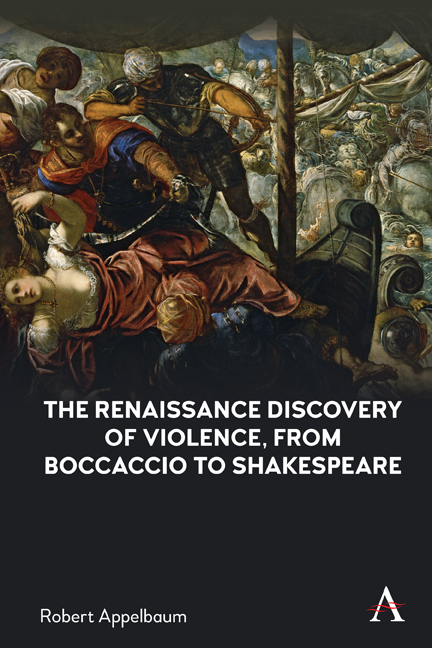Book contents
- Frontmatter
- Dedication
- Contents
- A Note on the Texts
- Acknowledgments
- Preface
- Chapter One Overture: The Show of Violence
- Chapter Two The Moral Economy of Violence in the Renaissance Novella Collection: Straparola, Bandello and Marguerite de Navarre
- Chapter Three Pacifism, Erasmus and More
- Chapter Four Violence as Labor: The Heroic Narrative
- Chapter Five “Tragedy Shows Us What We Must Flee From”
- Afterword
- Select Bibliography
- Index
Chapter Four - Violence as Labor: The Heroic Narrative
Published online by Cambridge University Press: 16 December 2021
- Frontmatter
- Dedication
- Contents
- A Note on the Texts
- Acknowledgments
- Preface
- Chapter One Overture: The Show of Violence
- Chapter Two The Moral Economy of Violence in the Renaissance Novella Collection: Straparola, Bandello and Marguerite de Navarre
- Chapter Three Pacifism, Erasmus and More
- Chapter Four Violence as Labor: The Heroic Narrative
- Chapter Five “Tragedy Shows Us What We Must Flee From”
- Afterword
- Select Bibliography
- Index
Summary
Violence as Labor
E cominciarno il dispietato gioco: “And they began their pitiless game.” Thus in Orlando Innamorato Matteo Maria Boiardo's narrator describes the opening of a fight between the titular Orlando and one of his enemies, the Spanish Saracen Feragu. The combat between them is a “game,” but the game is “pitiless.” The next sentence takes up the “cruelty” (crudeltate) of what they are doing to one another, and the damage they are doing to one another's shield and armor. But then, out of the blue we are told “Their flesh—enchanted—can't be cut.” Can't be cut? In other words, neither of them can win this ruthless game? Actually, “Neither one was sure he’d win.” The equivalence of the combatants is key. For in a narrative of this type, a heroic narrative and an epic romance, violence aspires at once toward symmetry and precedence as well as gamesmanship. If the world of the novella, as we saw, is about asymmetry, the imbalances of power between perpetrators and victims, and the inevitable inequities of outcomes, the world of the heroic narrative (leaving apart stories about supernatural beings) is all about equivalence, about sustaining and proving equivalence even unto death, even in spite of the fact, or because of the fact, that society (Christian, pagan and Muslim alike) is strictly hierarchical, and the highest reward for entering into a symmetrical combat and emerging victorious is precedence. The best fights are those where outcomes are uncertain because the combatants are equal in status and prowess and they can do battle as if following the rules of a game. (The uncertainty of outcomes is also, of course, a key to the narrative drive of the poem, enabling suspense and delay.) In this case, however, as in so many others, the fight is interrupted. A damsel in distress needs their help. And so, for now the “ruthless game” is over.
Orlando Innamorato would never be finished. After 35,000 lines it breaks off, in the middle of the action, the author announcing that he can't go on for now: “while I sing, o my redeemer, / I see all Italy on fire, / because these French—so valiant!—/ come to lay waste who knows what land” (3.9.26).
- Type
- Chapter
- Information
- Publisher: Anthem PressPrint publication year: 2021

